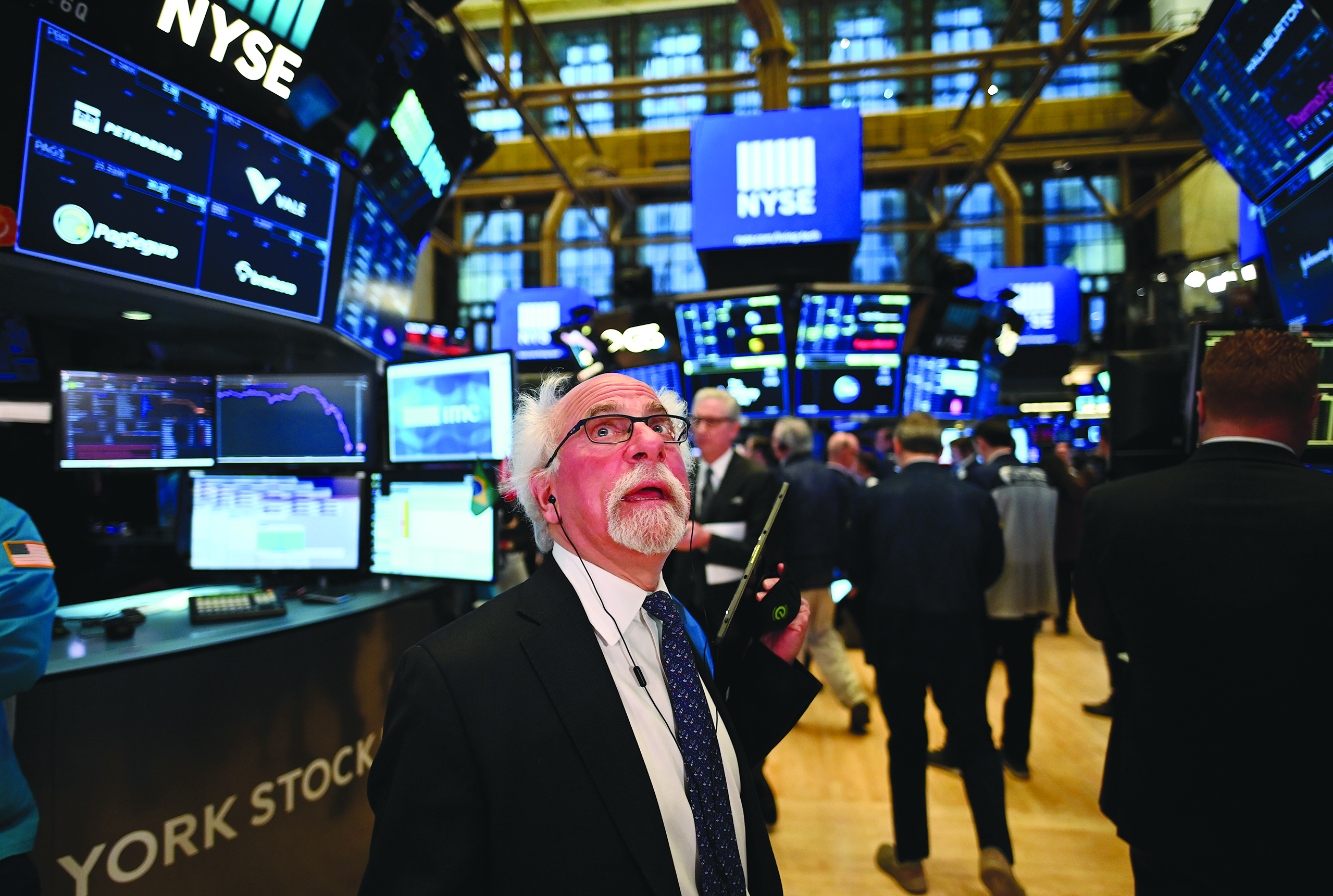
LONDON: Stock markets and oil prices went into freefall yesterday as interest rate cuts and fresh stimulus measures by central banks failed to lift confidence, with analysts warning that the Federal Reserve may have reached the limits of its power to fend off recession as the coronavirus spreads. Brent North Sea oil plunged more than ten percent to a four-year low, as a price war between major producers Saudi Arabia and Russia added to sliding crude demand caused by the virus.
The euro surged one percent against the dollar after the Fed on Sunday slashed borrowing costs to almost zero-its second emergency cut in less than two weeks. The US central bank also unveiled a massive asset-buying program, similar to measures put into place during the global financial crisis more than a decade ago. The Bank of Japan joined in yesterday, saying it would ramp up its bond-buying program.
New Zealand's central bank also slashed rates to record lows in an attempt to cushion the economic blow, while the People's Bank of China has injected vast sums into financial markets to ease liquidity worries. In joint action coordinated with the European Central Bank, Bank of England, Bank of Japan, Bank of Canada and the Swiss National Bank, the Fed moved to counteract global "dollar funding pressures" according to its boss Jerome Powell.
But traders were left unimpressed, with the virus showing no sign of letting up, while the head of the World Health Organization chief Tedros Adhanom Ghebreyesus said it was impossible to tell when it would peak globally. The drastic manoeuvres were aimed at cushioning the economic impact as the breakneck spread of the coronavirus all but shut down more countries, but they did little to calm panicky investors worried about firms surviving a prolonged recession.
Trading on Wall Street was halted immediately after the opening bell yesterday, as stocks posted steep losses following emergency moves by the Federal Reserve to try to avert a recession due to the coronavirus pandemic. Just after the opening bell, the S&P 500 was at 2,490.47, a drop of 8.1 percent and beyond the seven percent loss that automatically triggers a 15-minute trading halt.
The Dow Jones Industrial Average fell 9.7 percent, or around 2,250 points, to 20,935.16, while the tech-rich Nasdaq Composite Index tumbled 6.1 percent to 7,392.73.
European stocks plunged close to 10 percent in brutal trading conditions that also sent volatility gauges surging to record highs and had Wall Street traders expecting more major damage when US markets reopen. Futures had quickly hit their down limits overnight but the SPDR S&P 500 exchange traded fund was pointing down 10 percent, while shares of Bank of America Corp, JPMorgan, Goldman Sachs and Citigroup fell between 14 percent and 17 percent in premarket trading. Technology heavyweights such Apple , Microsoft and Amazon were together set to lose over $400 billion in market value.
"The central banks threw the kitchen sink at it yesterday evening yet here we are (with deep falls in stock markets)," said Societe Generale strategist Kit Juckes. "There is a great sense that central banks are going to get to grips with the issues of getting money flowing … But the human problem, the macro problem, there is nothing they can do about that."
Almost everything was walloped. Oil, already reeling from a price war, slumped 11 percent to almost $30 a barrel, metals buckled and even traditional safe-haven gold dropped 5 percent as investors fretted about the impact its global demand. There were moves in Europe to curb short-selling of stocks, while bond markets tried to juggle both the risk to vulnerable countries but also that a fiscal spending splurge might impact safe-haven debt.
Airlines and tourism groups were the biggest fallers after slashing capacity, with TUI down by a third and British Airways-parent IAG crashing 23 percent. The car sector also slid as Italian-American automaker Fiat Chrysler said it was suspending production at most of its European plants until March 27. "While these (central bank) moves may go some way to easing any potential blockages in the plumbing of the financial markets, they won't adequately compensate for the upcoming economic shocks that are about to come our way," said CMC Markets analyst Michael Hewson.
The scale of the crisis was laid bare by data showing Chinese industrial production for January and February shrank 13.5 percent, the first contraction in around 30 years. Equity markets continue to be whipsawed by the disease, which has now infected almost 170,000 people and killed more than 6,000 with several countries going into lockdown as Europe becomes the new epicenter of the outbreak.
Asia meltdown
Sydney's stock market led losses in Asia-Pacific, tumbling 9.7 percent in its worst daily drop on record, while Manila shed nearly eight percent and Bangkok and Mumbai dropped more than five percent. Hong Kong, Singapore, Taipei and Jakarta all lost more than four percent. Wellington and Seoul were more than three percent off.
Shanghai tumbled 3.4 percent after the release of the industrial production data, which came a week after news that Chinese exports had collapsed. Tokyo ended 2.5 percent lower, after a rally sparked by the Bank of Japan's support measures announcement fizzled. The broad retreat followed a tumultuous week that saw some stock markets suffer their worst days in decades and in some cases their worst ever.
And experts said there was a concern that the Fed might be running on empty with regards to further action. Sunday's move "raises the question of whether the Fed has anything left in the tank should the spread of the virus not be contained", said Kerry Craig at JP Morgan Asset Management. "Our view is that the drag on the services sector from social distancing policies and shock from the fall of the oil price on the energy sector will be enough to tip the US into recession, but not necessarily a long one." - Agencies











